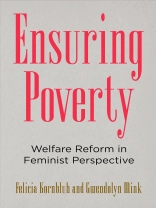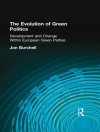In Ensuring Poverty, Felicia Kornbluh and Gwendolyn Mink assess the gendered history of welfare reform. They foreground arguments advanced by feminists for a welfare policy that would respect single mothers’ rights while advancing their opportunities and assuring economic security for their families. Kornbluh and Mink consider welfare policy in the broad intersectional context of gender, race, poverty, and inequality. They argue that the subject of welfare reform always has been single mothers, the animus always has been race, and the currency always has been inequality. Yet public conversations about poverty and welfare, even today, rarely acknowledge the nexus between racialized gender inequality and the economic vulnerability of single-mother families.
Since passage of the Personal Responsibility and Work Opportunity Reconciliation Act (PRWORA) by a Republican Congress and the Clinton administration, the gendered dimensions of antipoverty policy have receded from debate. Mink and Kornbluh explore the narrowing of discussion that has occurred in recent decades and the path charted by social justice feminists in the 1990s and early 2000s, a course rejected by policy makers. They advocate a return to the social justice approach built on the equality of mothers, especially mothers of color, in policies aimed at poor families.
สารบัญ
Preface
Chapter 1. Legislating the Personal Responsibility of Poor Mothers
Chapter 2. Welfare (Reform) as We Knew It
Chapter 3. Change They Believed In
Chapter 4. The New Democratic War on Welfare
Chapter 5. Welfare Ends
Chapter 6. Rethinking TANF as If Mothers Matter
Chapter 7. Patriarchal Consensus: Gender and Poverty Under Bush and Obama
Conclusion. Toward Ending the Vulnerabilities of Single Mothers in Poverty
Appendix. Women’s Committee of 100/Project 2002, ‘An Immodest Proposal: Rewarding Women’s Work to End Poverty’
Notes
Index
Acknowledgments
เกี่ยวกับผู้แต่ง
Felicia Kornbluh is Associate Professor of History and Gender, Sexuality, and Women’s Studies at the University of Vermont. She has written for many publications, including The Nation, Feminist Studies, Los Angeles Times, Women’s Review of Books, Journal of American History, and In These Times. Cofounder of Historians for Social Justice, she is a long-standing member of the Women’s Committee of 100, an advocacy organization.












